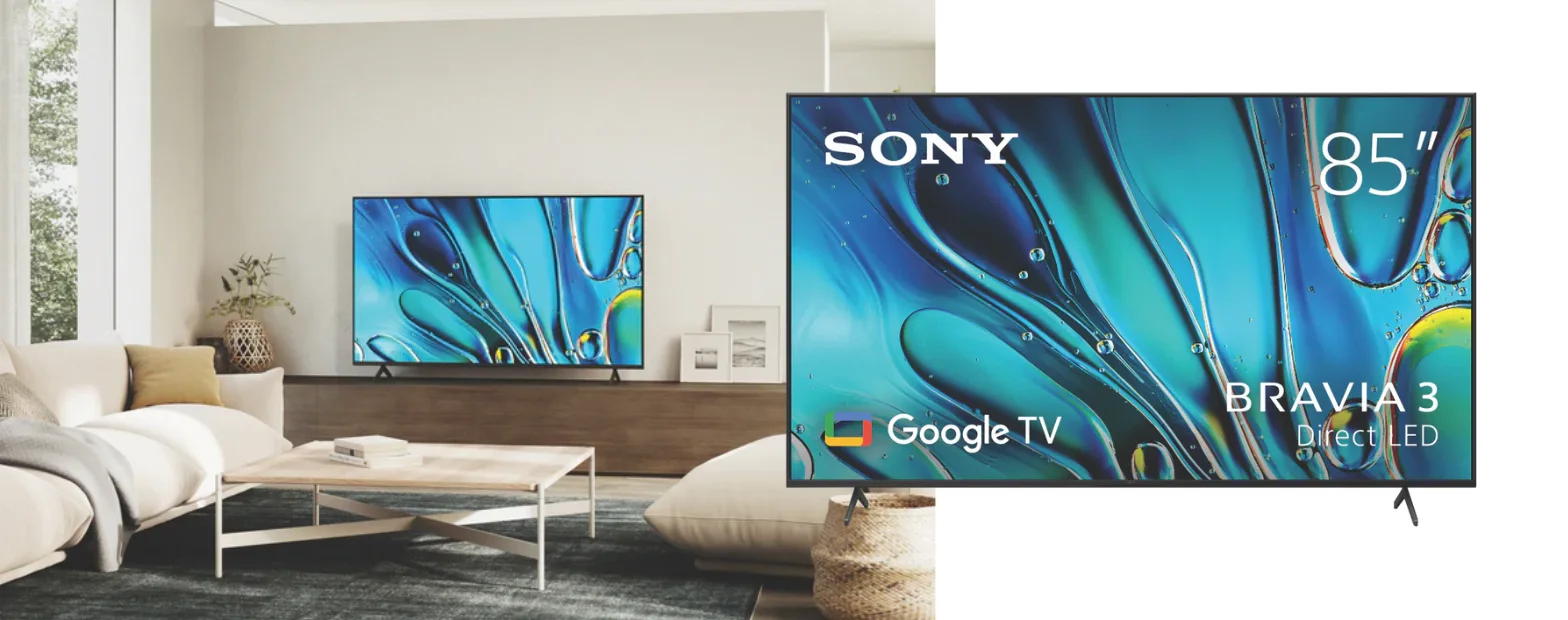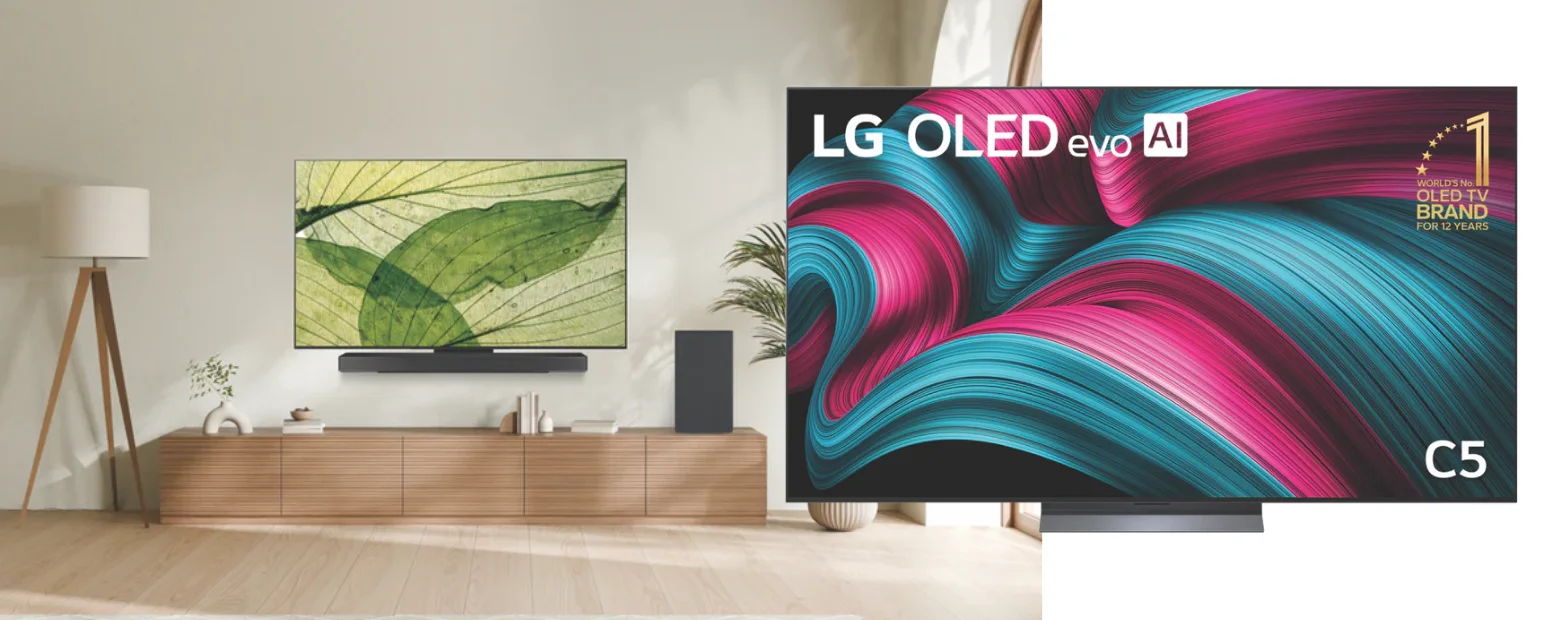ARTICLE
Your ultimate guide to the best 4K TVs for gaming
September 2, 2025-5 min read
The phrase ‘bigger is better’ definitely applies when playing video games. If you’re a die hard fan, you know how important it is to find the best TV for gaming because playing Minecraft on a lagging screen is frustrating, but all is not lost. TVs have come a LONG way in the past decade, especially when it comes to gaming. If you’re looking to upgrade your TV or dip a toe in the water as a newbie gamer, welcome to the world of 4K.
With a 4K TV, you can turn your home into a virtual arcade and level up your leisure time. With TVs specifically designed for today’s best video games, like Call of Duty and Final Fantasy, the whole experience of gaming has been revolutionised. Let’s take a deep dive into the best 4K TVs for gaming and get you up to speed with all the lingo.

First, What Is 4K?
To help you understand just how crisp a 4K TV is, you first need to wrap your mind around the screen resolution. 4K refers to the screen’s horizontal display resolution and it’s around 4,000 pixels. So, when it comes to looking at anything on screen, the higher the resolution, the more information can be displayed, which is what gives you a better image.
The screen resolution of a 4K television isn’t the only perk. These TVs are built for gamers and it’s virtually impossible not to find a good one. If you want to know which 4K TV is best for gaming, look no further – we’ve got it covered.
Introducing HDR (High-Dynamic-Range)
By far one of the biggest advances in video game console technology has been the shift to HDR. To take full advantage of game graphics and console features, you’ll likely need to have a HDR compatible TV.
Essentially, HDR is what makes games look so darn great these days. It allows for more visual detail to be packed into each scene – details that are typically lost due to the contrast of light and dark on a normal TV. Pretty cool, huh?
When you choose your 4K TV, make sure you ask to make sure it's HDR compatible. Future you will thank you when they’re sinking hoop after hoop playing NBA 2K20.
“Whether you’ve been gaming since Atari or have just picked up your first Nintendo, getting the right TV will make all the difference.”
OLED vs QLED vs LED
Get ready to learn some new phrases. Even though the words above look almost identical, they are all different types of light-based technology.
QLED is short for Quantum Light-Emitting Diode. Don’t panic – it’s the technical term for a way of an LED TV with a layer of tiny nanoparticles (called quantum dots). It’s what gives this type of TV its super-charged colour and brightness. Sony pioneered the technology in 2013, but Samsung followed shortly after, so you’ll see QLED TVs from well-known brands like TCL, Sony and Hisense, amongst others.
OLED, on the other hand, which stands for Organic Light-Emitting Diode works a little differently. Even though it has LED in its name, it doesn’t use the same backlighting technique as QLED or LEDs. In an OLED TV, each pixel is a mini LED, so it produces its own light and colour.
One of the biggest differences between these three types of TVs is their ability to generate a black level on screen. OLEDs have the advantage here because when they need to generate a black colour, they simply switch off the pixels. QLEDs and LEDs have to dim the backlight in order to even get close, so if you’re playing a rather dark and stormy video game, an OLED might be the better choice for maximum impact.
What To Look For In A 4K TV For Gaming
Is a 4K TV worth it for gaming? Absolutely! And the best part? There’s a stack of choices when it comes to 4K TVs, and it will largely come down to your budget and how much space you have at home.
To get started, let’s take a look at a few things you need to consider before you buy.
Response Time
This is probably the biggest factor when it comes to choosing a 4K TV for gaming. Response time – or your TV’s input lag – is the time it takes from when you press a button on your controller to when the action appears on your screen. The longer it takes your TV to register the action, the longer the lag (and the greater your frustration, we bet!). An input lag rating below 25ms is best so make sure you do some research.
Refresh Rate
Simply put, the refresh rate is how many times per second the image on a TV changes. It’s a number in hertz (or Hz) and the higher the number, the less motion blur you’ll see. This is ideal for gaming because there’s so much action happening on the screen ALL the time. A smooth and crisp picture means you are less likely to miss any hidden (or not so hidden) details of the game you’re playing.
Connectivity
To connect your PS4 or other gaming console to your 4K TV, you’re likely going to need a HDMI cable. Plus, the newer consoles are always shaking things up when it comes to connectivity, mostly to make your gaming experience better than ever. So, it’s important to check that the TV you’re looking at has the right built-in ports.
Choose Your Destiny
Now that you know the nuts and bolts of what to look for in a 4K TV, it’s time to explore a few practical options. As mentioned earlier, there’s a lot of choice in this area, so it’s important to work out what’s most important to you: is it rich colours? Or maybe it’s a lower input lag? It all depends on the games you regularly play, how you’re going to use the TV, and what space you have at home.
To kickstart your research, here are a few options.
OLED 4K TVs For Gaming
For a sleek wall-mountable option, try Sony's 85" BRAVIA 8 4K HDR OLED Google TV. This incredible TV has a full array backlight and a master series processor, meaning it’s faster than many of its competitors when it comes to screen lag. Plus, its realistic picture quality with beautiful contrast, deep blacks and rich colours, will make you feel as if you’re IN the action (not controlling it). Add HDMI 2.1 to all this, and you’ll get to feel a much smoother gameplay.

You won’t miss a thing with the LG 77" OLED EVO C5 AI UHD 4K Smart TV 2025. With more than 8 million self-lighting pixels, no rock will be unturned or cave unexplored. Enjoy lightning-fast response time and because of its compatibility with Nvidia G-Sync, you’ll see every game at its absolute best. Plus, this slim and stylish TV will win over the most anti-gaming person (you can watch almost cinema-quality movies on it, too).

Using ‘Game Mode’ On 4K TVs: Does It Work?
A nice bonus feature of 4K TVs is that they already have a built-in setting to boost your gaming experience. If you’re asking, “should I use game mode on my 4K TV?”, then the answer is yes – give it a try!
Whether you’ve been gaming like a pro for years or have just picked up your first Nintendo, getting the right TV will make all the difference. Check out our full range of the best TVs for gaming. Ready, set – GAME!





